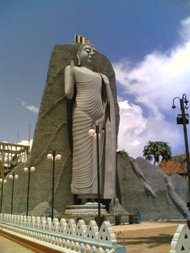Deep Impact? Asteroid Apophis on collision course towards Earth
One hundred years back, in 1907, a mysterious heavenly body slammed into the Earth's atmosphere above Russian Siberia and vaporised instantly on its fiery entry. The result: 2150 sq km of forest area in Siberia's Tunguska was wiped out. The explosion had the force of a 10 megaton nuclear bomb. It is still not clear whether the cosmic visitor was a comet or an asteroid. It does not matter anymore. There is another unwelcome visitor headed towards the planet at 1,11,600 km an hour. It is four times the size of the earlier guest and is expected to impact Earth in 2036. The asteroid hurtling towards Earth is named Apophis. According to ASE, Apophis may strike the Planet on April 13, 2036. The chances are now supposed to be low, and its hazard potential has been reworked several times, but the actual chances of a Deep Impact will be known only by 2014, when more data is collected.
The Association of Space Explorers (ASE), an organisation of astronauts and cosmonauts has written an open letter to the United Nations calling for action to deflect asteroid Apophis before it reaches Earth's orbit. The threat is not one, but two. Asteroid Apophis is expected to pass by Earth the first time in 2029, sparing it by a mere 30,000 km. At its closest point to Earth, Apophis will be closer to Earth than the man-made geosynchronous satellites orbiting the planet. However, it is feared that the Earth's gravity will pull the Apophis asteroid closer to its own orbit so that it comes in the direct impact trajectory in 2036. This will be the closest an asteroid of this size has approached the Earth in 1300 years.
According to ASE, a non-governmental body under the auspices of the United Nations must the study the Apophis orbit in detail and if necessary, take pre-emptive measures to keep Earth out of harm's way.
Asteroid collisions can have disastrous consequences. It is believed that several species on the Earth got wiped out and cleared the way for the evolution of other species while Earth was periodically pounded by asteroids across millions of years. It is also hypothesised that asteroid collisions led to the extinction of dinosaurs at the end of Cretacious era.
It is feared that if Apophis manages to plunge head on into Earth, it will have similarly cataclysmic consequences, which will make the Asian tsunami look like small change. Unlike regional dislocations, the damage wrecked by a possible Apophis collision will be global. While the Siberian space body exploded and burnt up due to friction with Earth's atmosphere before reaching the ground, a larger piece of cosmic material is likely to travel all the way down and impact the planet at unbelievable speeds. Though several thousand other NEOs (Near Earth Objects) have been identified in the last few decades, the Apophis has been singled out because of the very close orbit it will be taking.
Academics have been debating the pros and cons of impacting asteroids with space weapons for long. While some believe that asteroids like Apophis can be vaporised on their entry to solar system with powerful nuclear bombs, others claim this will only break up the asteroid into a million pieces which will still head all the way to Earth. Some others propound the idea of using a spacecraft's gravity to deflect the asteroid from its deadly path. Apophis, which is about 460 feet long, would take about 12 days of gravity-tugging with a spacecraft deployed for this purpose. However, this is still untested terrain and its efficacy also remains in doubt.
According to former astronaut Rusty Schweickart, the response to a threat of this scale should be global, rather than country-specific. He said that the ASE will be making a presentation to the United Nations in 2009.
Recently, the US authorities had asked NASA to upgrade its tracking of near earth asteroids like the Apophis. According to Nasa, the impact of an object like the Apophis hitting the Earth depends on what the asteroid is made of, besides its speed and angle of impact.
Asteroid Apophis was discovered on June 19, 2004, by Roy A. Tucker, David J. Tholen, and Fabrizio Bernardi of the NASA-funded University of Hawaii Asteroid Survey from Kitt Peak National Observatory in Arizona. Apophis is the Greek name for an evil character in the Egyptian mythology who dwells in the dark underworld and attempts to destroy the Sun during its nightly passage.
"Star Lanka Online" Our NEW Web site And Web TV Channel Launched
TFGE , The Future Global Educational Center Has Launched
the official web site, called
*** Star Lanka Online Dot Com ........................
www.starlankaonline.com will be completed in very near future....
*** Star Lanka Online TV Channel,..................
Just One Click ahead ...
Now you can watch "Star Lanka Online TV" channel broadcasts from Matara, Sri Lanka in most part of the day. Still we are keeping a test transmission also. There is a link right side of your hand to watch our TV channel. You can watch (Click On the Box) live channel on this site without going to another site to watch the TV. and also recorded parts, following the below link.
the official web site, called
*** Star Lanka Online Dot Com ........................
www.starlankaonline.com will be completed in very near future....
*** Star Lanka Online TV Channel,..................
Just One Click ahead ...
Now you can watch "Star Lanka Online TV" channel broadcasts from Matara, Sri Lanka in most part of the day. Still we are keeping a test transmission also. There is a link right side of your hand to watch our TV channel. You can watch (Click On the Box) live channel on this site without going to another site to watch the TV. and also recorded parts, following the below link.
Place your Own Ad Here
Thursday, September 27, 2007
Deep Impact? Asteroid Apophis on collision course towards Earth
Subscribe to:
Post Comments (Atom)





















































No comments:
Post a Comment